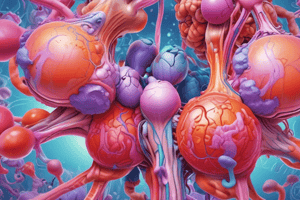Podcast
Questions and Answers
What is the mnemonic to remember the 6 anterior pituitary hormones?
What is the mnemonic to remember the 6 anterior pituitary hormones?
FLAT PIG
Which of the following hormones is responsible for saving water in the body?
Which of the following hormones is responsible for saving water in the body?
What is the primary function of the thyroid gland?
What is the primary function of the thyroid gland?
Calcitonin increases calcium levels in the blood.
Calcitonin increases calcium levels in the blood.
Signup and view all the answers
Which hormone is responsible for increasing blood sugar levels during a stress response?
Which hormone is responsible for increasing blood sugar levels during a stress response?
Signup and view all the answers
What are the two hormones produced by the pancreas that regulate blood sugar?
What are the two hormones produced by the pancreas that regulate blood sugar?
Signup and view all the answers
Which of the following is NOT a function of estrogen?
Which of the following is NOT a function of estrogen?
Signup and view all the answers
Study Notes
Endocrine System Overview
- The pituitary gland is the "boss" of the endocrine system, controlling other glands.
- It's divided into anterior and posterior sections, each releasing different hormones.
- Anterior pituitary releases six hormones (remembered by "FLAT PIG"): FSH (follicle-stimulating hormone), LH (luteinizing hormone), ACTH (adrenocorticotropic hormone), TSH (thyroid-stimulating hormone), prolactin, and growth hormone.
- Posterior pituitary releases two hormones (remembered easily as "EASY"): ADH (antidiuretic hormone) and oxytocin.
- The hypothalamus directs the pituitary gland.
Thyroid Gland
- The thyroid gland manages metabolism, controlling how fast the body burns energy.
- It produces hormones T3 and T4 for metabolism and calcitonin to lower blood calcium.
- Thyroid-stimulating hormone (TSH) from the pituitary tells the thyroid to release T3 and T4.
Thyroid Disorders
- Hyperthyroidism (too much T3/T4) causes a fast metabolism, high heart rate, sweating, and weight loss.
- Hypothyroidism (too little T3/T4) leads to a slow metabolism, fatigue, and weight gain.
Parathyroid Glands
- The parathyroid glands control calcium levels.
- Parathyroid hormone (PTH) increases blood calcium levels by pulling calcium from bones and activating vitamin D to absorb more calcium.
- Calcitonin (from the thyroid) does the opposite, putting calcium back into the bones.
Adrenal Glands
- The adrenal glands sit on top of the kidneys.
- The adrenal cortex (outer layer) produces steroid hormones, including aldosterone (regulating sodium and water balance) and cortisol (stress hormone).
- The adrenal medulla (inner layer) releases fight-or-flight hormones like epinephrine and norepinephrine.
Pancreas
- The pancreas controls blood sugar levels.
- Insulin lowers blood sugar by moving glucose into cells.
- Glucagon raises blood sugar by breaking down stored glycogen.
Gonads (Ovaries & Testes)
- Ovaries produce estrogen and progesterone, critical for the menstrual cycle and pregnancy.
- Testes produce testosterone, essential for sperm production and male characteristics.
- The pituitary gland (FSH and LH) controls the gonads.
Studying That Suits You
Use AI to generate personalized quizzes and flashcards to suit your learning preferences.
Related Documents
Description
This quiz covers the key functions and hormones of the endocrine system, focusing on the roles of the pituitary gland and the thyroid gland. It includes details about hormone secretion, metabolism management, and common thyroid disorders like hyperthyroidism. Test your knowledge on how these glands regulate bodily functions.




